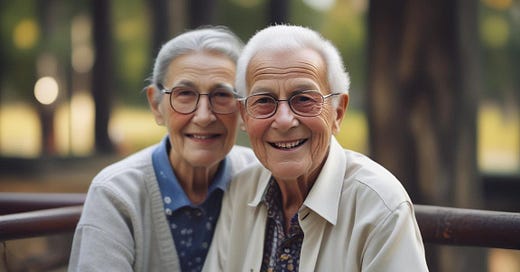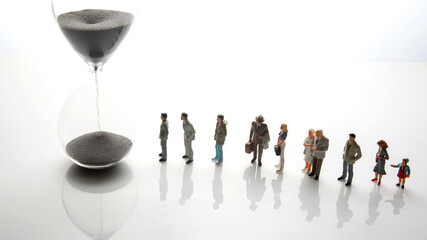According to life expectancy statistics, we’re living longer than any time in history. In fact, in less than a century, approximately 30 years seem to have been added to our collective life spans. This creation of old age is said to be the most important adaptive change the human species has ever witnessed.
By itself, this information is enough to make the head spin. But now experts also state that we may be nearing the time when science will double the lifespan of humans. This scenario, while breathtaking, seems firmly rooted in the realm of fantasy.
The Guinness Book of World Records, in numerous editions from the 1960s to 1980s, stated: “No single subject is more obscured by vanity, deceit, falsehood, and deliberate fraud than the extremes of human longevity.”
Lies and Statistics
Statistics serve as the primary method to persuade us that we are experiencing longer lifespans. While they can be highly effective in communicating specific data, they are also susceptible to being manipulated to support flawed theories. And since people seem spellbound by scientifically collected data, this presents a huge problem.
Statistics, we are told, don’t lie. True, but liars use statistics. Mark Twain correctly proclaimed, “There are lies, more lies, and statistics.” The data frequently utilized to illustrate progress in life expectancy is, at best, deceptive. It employs a calculation centered on a reduction in infant mortality rates to imply that individuals are living longer. While this misinformation may lead to favorable policies and economic benefits, it rarely reflects reality.
We have to understand that statistics are averages, not actual figures. The term “life expectancy” merely describes the anticipated average age at time of death. So when it is reported that life expectancy has risen, it simply means that on average, someone born today will live longer than someone born in previous years, based on mitigating factors.
The Longevity Myth
At the turn of the century, many children died at an extremely young age, while today that trend has largely reversed. As modern children grow into adulthood, their “additional” years of life make the average age at death go up, which exaggerates statistics when compared to years ago.
Between 1920 and today, US infant mortality has decreased from more than 100 per 1000 to 10.9 per 1000. Yet during this same time span, life expectancy is said to have increased from 50 to roughly 80 years. That’s a thirty year difference we are told to swallow.
Now consider this: According to statistics, when an adult in 1920 turned 60 years old, he could expect to live an average of 16 more years, to about 76. Today, a 60-year-old adult can expect to live 20 more years, to about 80 years old.
So instead of a 30 year increase, we are looking at a mere four-year difference in life expectancy. The only dramatic change in the last eighty-six years has been our chance of surviving to 60.
I’ll explain it another way. Hypothetically, if 50 of 100 babies born in 1900 die in infancy, while the rest live to be 100 years old, the average life expectancy is an age of 50 years. If 100 babies born in 1920 all survive infancy and live to be 80, then the average life expectancy is 80. At first glance, it appears that people born in 1920 are living three decades longer than those born in 1900. However, this statistic is simply an average, influenced by a decrease in infant mortality rates.
Those in our society having reached eighty or ninety years of age are the only generation contributing to concrete numbers. All others must fall in the category of averages, which are estimates, and NOT guarantees we are living longer.
Age Reversing Mania
We too easily buy into longevity claims because we dislike the thought of dying. The belief of living longer or the use of age reversing substances has found deep roots thanks to slick media promotion and marketing. But nothing can reverse, halt or slow the aging process. All we can do is increase the resistance of the body to a wide variety of harmful influences. In other words, we can strengthen the defensive functions of the body and increase the chances of a healthy lifestyle and productive old age. That’s called living to our maximum genetic potential.
Still, time does show itself on our physique and in a vain effort to hide their age, many resort to extreme measures such as Botox, cosmetics, and plastic surgery. Others seek salvation in anti-aging medications and supplements, which do little more than feed vanity.
Does Modern Medicine Prolong Life?

What we die from today has changed dramatically from the turn of the century. Instead of communicable diseases, we are succumbing in greater numbers to degenerative diseases. And despite brash claims, powerful medicines can’t stop the rapidity of the aging process, nor the ultimate span of years beyond which the body simply wears out. They may be used (without much success) to delay, minimize, avoid, or eliminate chronic degenerative disease processes, but ultimately, they only prolong human misery.
We’re being fooled and lulled into complacently, trusting a system that’s failing spectacularly in supporting its grandiose claims. There a no light at the end of the tunnel regarding disease cures – despite untold billions going to research.
As a society, we face unprecedented rates of cancer, heart disease, obesity, diabetes and other dangers which logically, CANNOT contribute to extended lifespans. And within such an environment, the concept of an extended lifespan in infirmity becomes rapidly distasteful.
Instead of aimlessly looking to prolong or reverse the aging process – of denying or masking the outward signs – we should concentrate on emphasizing a natural lifestyle and removing causes of disease. Quality of life is always superior to spending time in misery and pain. It offers us the greatest opportunity to maintain a high level of physical and mental function.
Claims that longer lifespans are synonymous with disability are irresponsible and do little but feed the bottom line of pharmaceutical companies. Health authorities and media outlets should maintain a standard of truth and accuracy on the subject, without misleading or deceiving the public.
Graceful aging brings with it its own rewards of accumulated wisdom, skills, richness of experience, serenity and grace. But our biggest achievement will be to accept the inevitable with peace of mind and not go into denial. Being overly concerned about our physical state restricts our thinking process and leads to unwise decisions.
We can contribute more to family and society by thinking of others, rather than ourselves. But to do so, we must do everything in our power to maximize our biological potential. In this way we lead a long and vigorous life, and when the body finally wears out, we hope for a rapid and pain-free decline.
Your presence here is greatly valued. If you've found the content interesting and useful, please consider supporting it through a paid subscription. While all our resources are freely available, your subscription plays a vital role. It helps in covering some of the operational costs and supports the continuation of this independent, unbiased research and journalism work. Please make full use of our free library.









When you say emphasizing a natural lifestyle - your talking about using unprocessed foods, being more active ? Statistics I see now say if you get to 70 , the expected average is 16 years to 86, many will get into the 90s. I see much evidence that people who have successfully focused on fitness and nutrition and are hitting their 60s and 70’s are having more extended health spans. I agree with you there doesn’t seem to be any statistics that show significant supplements and other treatments is providing significant extended life span.
Great perspective Jorg. I’ve seen that analysis before. Critical thinking is needed when interpreting any statistics.